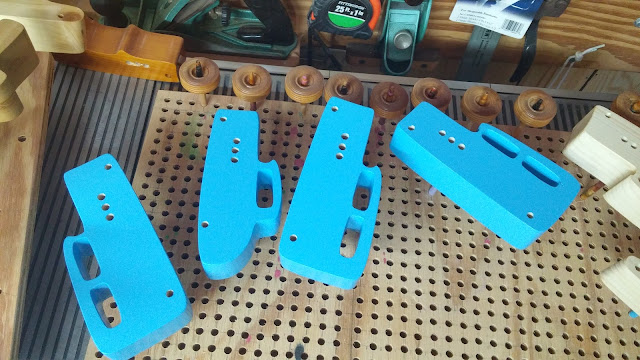 |
| Handmade Wood Toy Cars Hot Rod Freaky Fords Being Painted With Acrylic Baby Blue Paint |
Hot Rods
https://www.etsy.com/shop/odinstoyfactory?search_query=Hot+Rod
Toy Cars
https://www.etsy.com/shop/odinstoyfactory?section_id=34638962
Toy Trucks
https://www.etsy.com/shop/odinstoyfactory?section_id=34653279
Painting handmade wood toys can be a fun and creative way to add color and personality to your creations. While many types of paints exist, acrylic paints are often favored due to their versatility and ease of use. This blog post will discuss some tips and considerations when using acrylic paint to paint handmade wood toys, explicitly focusing on drying time vs. cure time.
First, let's briefly review the difference between drying and cure times. Drying time refers to the amount of time it takes for the solvent in the paint (in the case of acrylics, water) to evaporate, leaving behind a dry paint film. Curing and drying are usually measured in hours or days and vary depending on factors such as the thickness of the paint layer, the humidity and temperature of the environment, and the type of surface being painted on. Cure time, however, refers to the time it takes for the paint to harden and fully reach its maximum durability and adhesion. Depending on the same factors as drying time, this can take anywhere from a few days to a few weeks.
When painting handmade wood toys with acrylic paint, it is essential to keep both drying and cure time in mind. Here are some tips to help ensure a successful paint job:
- Prepare the surface: Before painting, ensure the wood surface is clean and free of dust or debris. Use sandpaper to smooth out any rough spots or splinters. Preparation is vital to a good finish.
- Use a primer: Primer and the decision to use it is generally optional and depends on the paint you are using. In some cases, applying a coat of primer can help the paint adhere better to the wood surface and prevent it from soaking into the grain. I usually want my paint to soak into the grain and rarely use primers.
- Thin coats: When applying the paint, use thin coats rather than thick ones. Thick coats can take longer to dry and cure and may also be more prone to cracking or peeling. If you need to apply a second coat, wait until the first coat is fully dry. Acrylics need to be bone dry before sanding, and you need to sand between each coat to get a smooth finish. Sanding between coats of paint is especially important if your final coat is a gloss finish.
- Allow for drying time: It is essential to allow each coat of paint to dry thoroughly before applying another coat or handling the toy. Drying can take anywhere from a few hours to a day or more, depending on the thickness of the coat and the humidity and temperature of the environment. I generally allow acrylic paints to dry overnight (12 or more hours) between coats. The paint needs to be bone dry before sanding. If the paint gums up your sandpaper it isn't dry enough.
- Allow for cure time: While the paint may feel dry to the touch after a few hours, it is essential to allow for sufficient cure time before handling the toy or exposing it to moisture. Curing can take several days to a few weeks, depending on the same factors as drying time. In my experience, flat paints dry and cure much faster than satin or gloss paint. I like to let my painted toys rest for several days.
- Consider a sealant: Once the paint is fully cured, you may want to apply a sealant to protect the paint and the wood surface. Again, make sure to choose a sealant suitable for wood and acrylic paint. Clear acrylics can be used for this purpose, and clear shellac will bond to just about any surface. This step is entirely unnecessary. I only apply a top coat to change the look of the toy. For example, you are applying a clear gloss acrylic to a toy painted with flat paint.
In summary, painting handmade wood toys with acrylic paint can be fun and rewarding, but it is essential to keep drying and cure time in mind. You can ensure a successful paint job by following these tips and allowing for sufficient drying and cure time.
#odinstoyfactory #handmade #woodtoys #madeinusa #madeinamerica



No comments:
Post a Comment